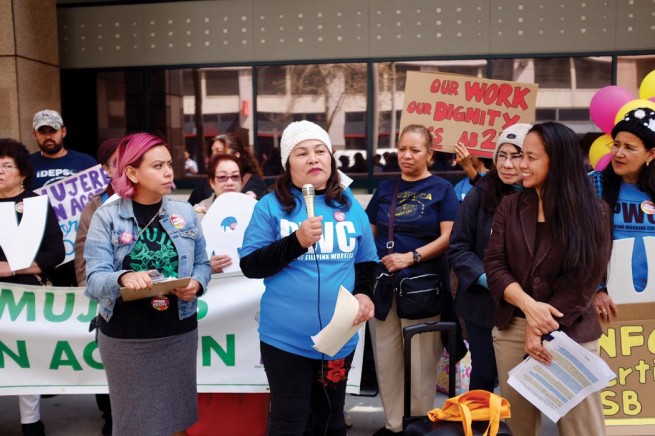Domestic workers call for stronger protection enforcement
LOS ANGELES — A day after International Women’s Day, dozens of domestic workers and advocates gathered in Los Angeles on Friday, March 9, to launch a statewide campaign for greater compliance with immigrant worker protections.
The campaign was also launched in San Francisco where Assemblymember Phil Ting was in attendance.
“I am so happy to gather with you today to stand in our collective power as immigrant working women, as domestic workers, nannies, caregivers, and house cleaners,” said Aquilina Soriano Versoza, executive director of Pilipino Workers Center (PWC).
“And on that note — happy International Working Women’s Day,” she added. “Today, we celebrate all of us women who are standing up against fear — uniting and making sure that the voices of domestic workers, of immigrant women workers, are heard.”
Central to the campaign is the introduction of Assembly Bill 2314, sponsored by Ting, which will include a Domestic Work Enforcement Program within the California Department of Labor Standards Enforcement. The program will focus on promoting fair labor standards by providing tools and resources to both domestic workers and employers.
‘Our work, our dignity’
“Dignity” was the key word at the launch as attendees chanted and held up signs reading “Our work, Our Dignity” in English, Filipino, and Spanish.
Lee Plaza, who has been working as a caregiver since arriving in the U.S. from the Philippines in 2012, spoke on behalf of domestic workers and reiterated the need for dignity in their work spaces.
“We want to provide dignified care and services as caregivers, as nannies, as house cleaners, but we also want to have dignity for ourselves and to receive what is due to us — fair labor practice, fair wages, and to be able to say that there is dignity with our work,” said Plaza in her speech.
Over 300,000 domestic workers work in private homes throughout California, with nearly two million households in the state depending on them to care for their loved ones and homes. Los Angeles alone has the largest concentration of domestic workers in the entire country.
Advocacy and efforts towards basic labor protections of domestic workers — many of whom are immigrant women — have been ongoing. Most recently, SB1015 extended the permanent right to overtime pay for domestic workers in 2016.
Yet, domestic workers continue to experience poor working conditions, with many still unaware of labor laws that protect them.
A 2012 national study of the domestic work sector found that one in four workers reported receiving less than minimum wage.
Educate employers
Often, domestic workers themselves are not aware of the labor laws that govern in their own homes.
“I have a lot of friends — not only Filipinos — that work, especially in board and care, and are receiving like $1,500 a month because they [employers] justify it by giving them free board and care and lodging. But account the lodging and the food, it won’t even amount to the minimum wage that we have,” Plaza told the Asian Journal.
In another instance, Plaza recalled showing up to work assigned by her agency, expecting to take care of one patient. Instead, her duties went beyond the job description and required her to take care of the patient’s spouse and grandkids, tend to the garden, and feed the cats and dogs.
“It’s just like buying one and taking more,” said Plaza.
Comedienne and actress Julia Wackenheim represented Caring Across Generations, and spoke from an employer’s point of view on the importance of supporting fair domestic worker rights for the wellbeing of the client.
“In the same way we go to our offices and expect a livable wage, insurance, a normal hourly wage — we must provide that for the caregivers that we employ,” said Wackenheim.
“The employees that work for me and my family had been in terrible situations previously where they were constantly in fear of their jobs, whether or not they would have enough money to pay for rent and food, and clothes, and that must stop now,” she added.
‘Work that makes all work possible’
In the Philippines, Plaza was an educator and dean at a university. She said many of her co-caregivers had their own careers back home too, with some even being medical doctors.
Coming into the undervalued domestic work industry where jobs are often seen as easy, substandard treatment and humiliation are commonly shared experiences.
“Caregiving or domestic work is the work that makes all work possible,” said Plaza, who like many, has had to work with clients dealing with dementia and Alzheimer’s. “Without us, the family of the patients that we are handling cannot really do what we do.”
Joining the leadership and advocacy side, Plaza is now looking to use her skills in educating both workers and employers on fair labor laws.
“Each one has the responsibility to know their obligations as employers, and we should also know our obligations as workers and our responsibilities too,” she said.


